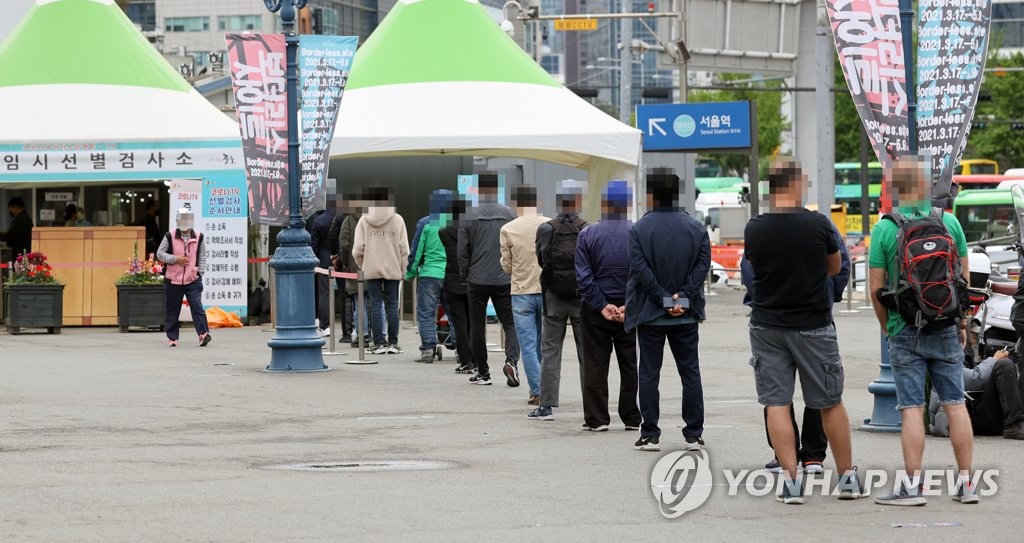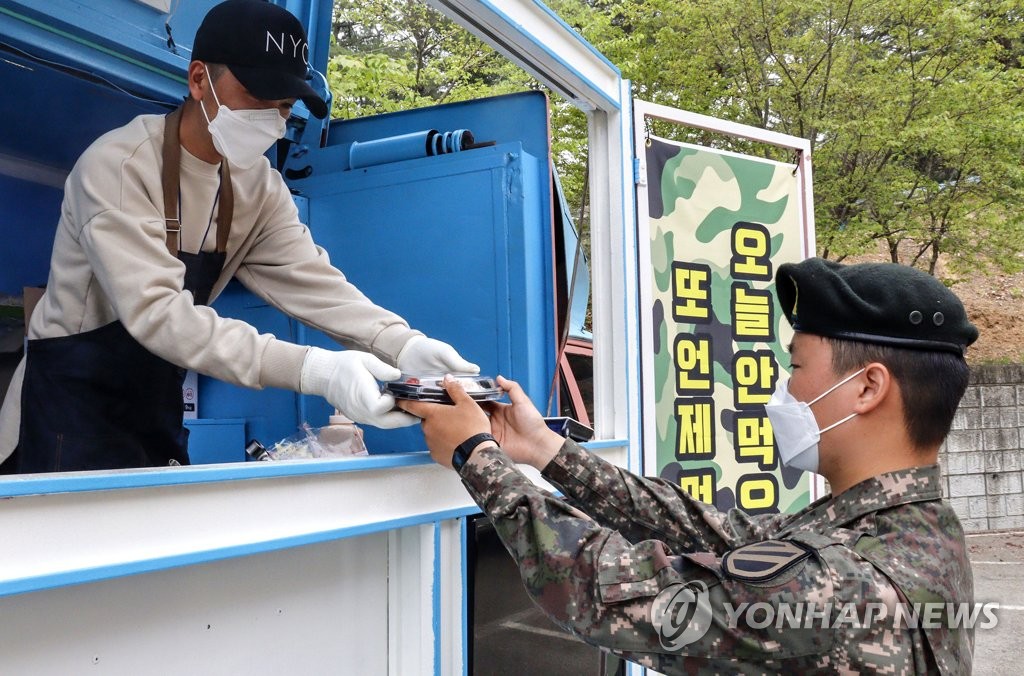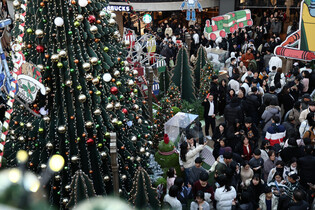 |
| ▲ Citizens line up to take new coronavirus tests at a temporary screening center in front of Seoul Station on April 24, 2021. (Yonhap) |
 |
| ▲ A soldier (R) receives a boxed lunch from a food truck crew, which is provided by the 11th Infantry Division of the South Korean Army in Hongcheon, 102 kilometers east of Seoul, in a bid to relieve stress created by the prolonged COVID-19 pandemic, in this photo provided by the division on April 23, 2021. (PHOTO NOT FOR SALE) (Yonhap) |
(3rd LD) coronavirus-additional cases
(3rd LD) New virus cases near 800 for 2nd day on increased cluster infections
(ATTN: UPDATES with more info in paras 15-17)
SEOUL, April 24 (Yonhap) -- South Korea's daily new virus cases stayed in the high 700s for the second straight day Saturday as community infections and untraceable cases continued to rise across the country.
The country reported 785 more COVID-19 cases, including 760 local infections, raising the total caseload to 118,243, the Korea Disease Control and Prevention Agency (KDCA) said.
The daily infections soared to the 700 range Wednesday, deepening woes over another wave of the pandemic in the country.
Untraceable cases represented 28.2 percent of all confirmed cases reported during the period from April 11 to Saturday. The defense ministry said Friday that 39 confirmed cases were reported in a military vessel named Gojunbong.
The country added one more death, raising the total to 1,812. The fatality rate was 1.53 percent.
The greater Seoul area, where more than half of the country's 52 million people resides, is under Level 2 social distancing, the third highest in the five-tier scheme, with the rest of the country under Level 1.5.
The current social distancing level will be in effect till May 2, while private gatherings of five or more people are banned nationwide.
On Friday, the Ministry of Food and Drug Safety (MFDS), the country's drug safety agency, gave conditional approval for two types of COVID-19 self-test kits developed by local biotech firms SD Biosensor and Humasis as a supplementary tool to bolster its testing capacity for the coronavirus.
The conditional approval will allow the two test kits to be used domestically until fully approved products roll out.
Amid global vaccine shortage concerns, the country said it has secured vaccines that can inoculate 79 million people.
As of midnight Friday, 2,195,492 people, or 4.3 percent of the population, had received one dose of the COVID-19 vaccine, up 158,581 from a day earlier, with 98,767 people, or 0.2 percent of the population, vaccinated with two doses, up 19,613 from a day ago.
AstraZeneca's vaccine took up 1,277,777, while Pfizer's accounted for 917,715, according to the KDCA.
A total of 13,332 cases of side effects after vaccinations have been reported, up 321 from the previous day, though 97.6 percent, or 13,095, of them were mild symptoms.
A total of 56 deaths after vaccinations have been reported, up three from a day earlier, according to the KDCA.
Also Saturday, the KDCA said South Korea has signed an additional deal with Pfizer to import its COVID-19 vaccine doses for 20 million people.
South Korea is set to receive Pfizer vaccine doses for 3.5 million people by the end of June. Additional vaccines for 29.5 million people are scheduled to be supplied to South Korea in phases.
The latest deal raised the total number of COVID-19 vaccine doses from the World Health Organization's global vaccine COVAX Facility project and pharmaceutical companies to an amount enough to inoculate 99 million people, an amount that is 2.75 times of the 36 million that is needed to achieve herd immunity here.
The pharmaceutical companies are AstraZeneca, Pfizer, Moderna, Johnson & Johnson's Janssen and Novavax.
Health authorities aim to create herd immunity by November. The country started its inoculation campaign in late February.
There are currently 204 injection centers nationwide, but the country plans to open an additional 53 centers next Thursday to speed up vaccinations.
Of the newly confirmed locally transmitted cases, 509 cases came from the capital area, with 251 from Seoul, 241 from Gyeonggi Province and 17 from Incheon, 40 kilometers west of the capital.
Including two from abroad, Seoul reported a daily increase of 253, the steepest daily increase since 258 cases were confirmed on Feb. 16. The capital's daily new cases were in the low 200s earlier this week before topping 250 on Friday.
The southern port city of Busan, the country's second-largest city, reported 44 more cases.
There were 25 additional imported cases, down 14 from a day earlier. The country's total number of imported cases is now at 8,145.
The total number of people released from quarantine after making full recoveries was 107,781, up 710 from a day earlier, with 8,650 people being isolated for COVID-19 treatment, up 74 from a day ago.
(END)
(C) Yonhap News Agency. All Rights Reserved

























![[가요소식] 엔하이픈 선우, 대한민국사회공헌대상 외교부장관상](/news/data/20251224/yna1065624915964391_170_h2.jpg)








